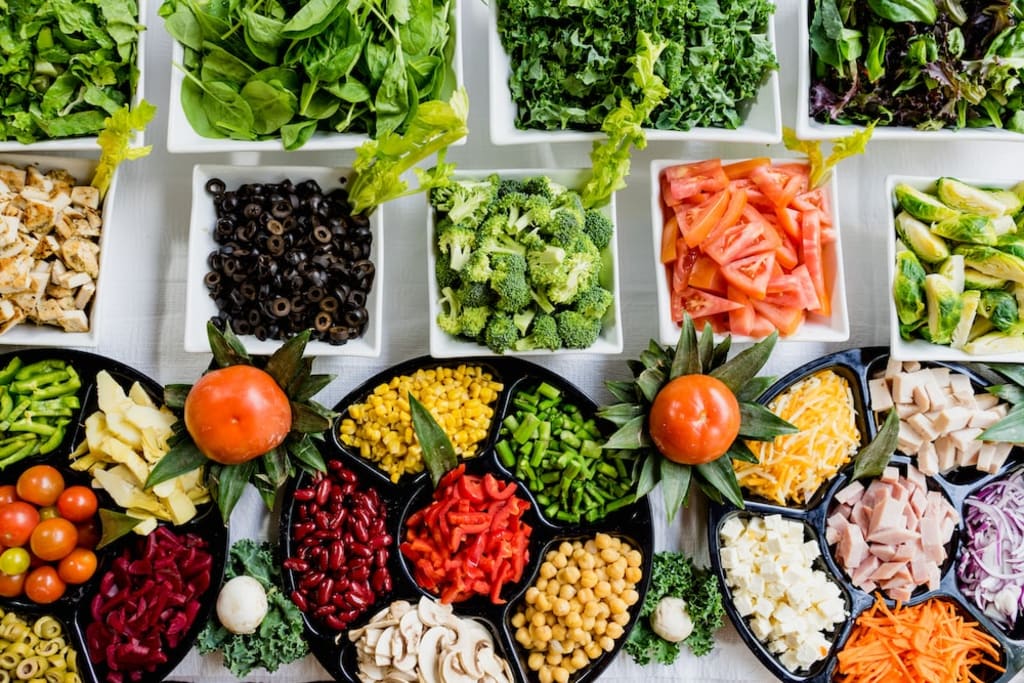Good Dieting
From Fast Food to Fresh Food: Transforming Your Diet for Better Health and Well-being

Are you tired of feeling sluggish and weighed down by your fast food habits? It's time to make a change and transform your diet for better health and well-being. Say goodbye to greasy burgers and hello to fresh, nutritious meals that will not only nourish your body but also boost your energy levels and improve your overall quality of life. In this article, we will explore the benefits of transitioning from a fast food diet to a diet focused on fresh, whole foods. We'll uncover the secrets to making this transition seamless and enjoyable, providing you with practical tips and expert advice along the way. So, if you're ready to take control of your health and embark on a journey towards a more vibrant and energized life, let's dive in and discover how you can make the switch from fast food to fresh food, one delicious bite at a time.
The importance of a healthy diet
A healthy diet is the foundation of overall well-being. The food we consume plays a crucial role in our physical and mental health, affecting everything from our energy levels to our immune system. When we consistently consume fast food high in unhealthy fats, sugars, and processed ingredients, we subject our bodies to a range of negative effects. These include weight gain, increased risk of chronic diseases such as heart disease and diabetes, and a lack of essential nutrients required for optimal functioning.
By prioritizing a healthy diet consisting of fresh, whole foods, we can reverse these negative effects and promote our well-being. Fresh foods are rich in vitamins, minerals, fiber, and antioxidants that support our immune system, promote digestion, and provide sustained energy throughout the day. They also contain fewer preservatives and additives compared to fast food, reducing our exposure to harmful chemicals.
Understanding fast food and its impact on health
Fast food has become a staple in many people's diets due to its convenience and affordability. However, it comes at a cost to our health. Fast food is typically high in unhealthy fats, refined carbohydrates, sodium, and added sugars. These ingredients can lead to weight gain, high blood pressure, and an increased risk of chronic diseases.
Additionally, fast food is often processed and prepared using artificial additives and preservatives to enhance flavor and extend shelf life. These additives, such as artificial sweeteners and hydrogenated oils, have been linked to various health issues, including inflammation, digestive problems, and an increased risk of cancer.
Consuming fast food regularly can also negatively impact our mental health. Studies have shown a link between fast food consumption and an increased risk of depression and anxiety. The high levels of processed ingredients and lack of essential nutrients in fast food can disrupt the balance of neurotransmitters in the brain, leading to mood imbalances.
The benefits of fresh food and whole ingredients
Now that we understand the detrimental effects of fast food, let's explore the benefits of incorporating fresh food and whole ingredients into our diet. Fresh food refers to unprocessed or minimally processed foods that are as close to their natural state as possible. These include fruits, vegetables, whole grains, lean proteins, and healthy fats.
One of the primary benefits of fresh food is its nutrient density. Fresh fruits and vegetables are packed with vitamins, minerals, and antioxidants that support our immune system and overall health. Whole grains provide essential fiber and B vitamins, while lean proteins and healthy fats are necessary for muscle growth, hormone regulation, and brain function.
In addition to their nutritional value, fresh foods are also more flavorful and satisfying compared to fast food. They provide a variety of tastes, textures, and colors that can make every meal a delightful experience. By focusing on fresh ingredients, we can create meals that are not only good for our bodies but also enjoyable to eat.
Transitioning from fast food to fresh food: practical tips and strategies
Making the transition from a fast food diet to a fresh food diet may seem overwhelming at first, but with the right strategies, it can be a seamless and enjoyable process. Here are some practical tips to help you get started:
Start gradually: Instead of eliminating fast food from your diet overnight, start by gradually reducing your consumption. This will allow your taste buds and body to adjust to healthier alternatives without feeling deprived.
Plan your meals: Meal planning is key to maintaining a healthy diet. Set aside time each week to plan your meals and create a grocery list. This will help you stay organized and ensure you have all the ingredients you need for nutritious meals.
Experiment with new recipes: One of the best ways to embrace fresh food is by trying new recipes. Look for healthy alternatives to your favorite fast food meals and experiment with different ingredients and flavors. You might be surprised by how delicious and satisfying fresh food can be.
Prepare meals in advance: To make healthy eating more convenient, consider prepping and cooking meals in advance. Prepare larger batches of meals and store them in portioned containers for easy grab-and-go options throughout the week.
Find healthier alternatives: Cravings for fast food can be challenging to resist. Instead of giving in to unhealthy options, look for healthier alternatives that satisfy your cravings. For example, swap French fries for baked sweet potato fries or opt for homemade burgers with lean meat and whole grain buns.
By implementing these strategies, you can gradually shift your diet from fast food to fresh food, making it a sustainable and enjoyable lifestyle change.
Meal planning and preparation for a healthy diet
Meal planning and preparation are essential when transitioning to a healthy diet. Without a plan, it's easy to fall back into old habits and reach for convenient, unhealthy options. Here are some tips to help you with meal planning and preparation:
Set aside time for planning: Dedicate a specific time each week to plan your meals. This could be on the weekend or any other day that suits your schedule. Use this time to browse recipes, create a meal schedule, and make a grocery list.
Create a meal schedule: Having a meal schedule can help you stay on track and avoid impulsive food choices. Plan out your meals for the week, including breakfast, lunch, dinner, and snacks. Consider incorporating a variety of fresh fruits, vegetables, whole grains, lean proteins, and healthy fats into each meal.
Make a grocery list: Once you have your meal schedule, create a grocery list based on the ingredients you'll need. Be sure to include fresh produce, pantry staples, and any other items required for your planned meals. Stick to your list when shopping to avoid unnecessary purchases.
Prep ingredients in advance: To save time during the week, consider prepping some of your ingredients in advance. Wash and chop vegetables, cook grains, and marinate proteins ahead of time. This way, you'll have everything ready to assemble meals quickly and effortlessly.
Batch cook and store: Batch cooking is a great way to have healthy meals readily available throughout the week. Prepare larger portions of your recipes and store them in individual containers. This will save you time and ensure you always have a nutritious meal on hand, even on busy days.
By implementing these meal planning and preparation strategies, you'll be setting yourself up for success in maintaining a healthy diet.
Incorporating more fruits and vegetables into your meals
Fruits and vegetables are the cornerstone of a healthy diet. They are packed with essential vitamins, minerals, and antioxidants that support our overall health and well-being. Here are some tips to help you incorporate more fruits and vegetables into your meals:
Variety is key: Aim to include a variety of fruits and vegetables in your diet. Different colors represent different nutrients, so try to incorporate a rainbow of produce into your meals. For example, orange fruits and vegetables are high in vitamin C and beta-carotene, while dark leafy greens are rich in iron and calcium.
Start with what you enjoy: Begin by incorporating fruits and vegetables that you already enjoy into your meals. This will make the transition easier and more enjoyable. If you're not a fan of raw vegetables, try roasting or sautéing them to enhance their flavor.
Experiment with new recipes: Trying new recipes is an excellent way to discover different ways to enjoy fruits and vegetables. Look for recipes that highlight specific produce or try ethnic dishes that incorporate a variety of vegetables. You may find new favorites that you never knew you liked.
Add them to every meal: Aim to include fruits or vegetables in every meal. Add berries to your breakfast cereal, include a side salad with your lunch, and incorporate roasted vegetables into your dinner. Snack on carrot sticks, apple slices, or celery with hummus for a nutritious midday snack.
Get creative: Don't be afraid to get creative with your fruit and vegetable choices. Incorporate them into smoothies, soups, stir-fries, and even baked goods. For example, use zucchini or carrots to make muffins or add spinach to your smoothie for an extra boost of nutrients.
By following these tips, you'll be well on your way to increasing your fruit and vegetable intake and reaping the many health benefits they provide.
The role of protein and healthy fats in a balanced diet
Protein and healthy fats are essential macronutrients that play a crucial role in our overall health and well-being. Including them in our diet is vital for various bodily functions, such as muscle growth and repair, hormone regulation, and the absorption of fat-soluble vitamins. Here's how you can ensure you're getting enough protein and healthy fats in your diet:
Choose lean protein sources: Opt for lean sources of protein, such as poultry, fish, beans, lentils, and tofu. These options are lower in saturated fat and calories compared to red meat and processed meats. Including a variety of protein sources in your meals will ensure you're getting all the essential amino acids your body needs.
Incorporate plant-based protein: If you follow a vegetarian or vegan diet, there are plenty of plant-based protein sources available. Legumes, quinoa, tempeh, and seitan are excellent choices that provide both protein and other essential nutrients. Combining different plant-based proteins in a meal can help create a complete protein source.
Choose healthy fats: Include sources of healthy fats, such as avocados, nuts, seeds, olive oil, and fatty fish like salmon or mackerel. These fats are rich in omega-3 fatty acids, which have been shown to reduce inflammation, support brain health, and promote heart health. However, it's important to consume healthy fats in moderation, as they are still high in calories.
Balance your macronutrients: Aim to have a balanced meal that includes a combination of protein, healthy fats, and carbohydrates. This will provide sustained energy and keep you feeling satisfied for longer. For example, pair grilled chicken with a side of quinoa and roasted vegetables, or have a salad with mixed greens, avocado, and grilled salmon.
By incorporating lean protein and healthy fats into your meals, you'll be supporting your body's optimal functioning and overall health.
The impact of processed foods on health and alternatives to consider
Processed foods have become a significant part of the modern diet. They are often convenient, affordable, and readily available. However, the excessive consumption of processed foods can have detrimental effects on our health. Here's why processed foods can be harmful and some alternatives to consider:
High in added sugars: Processed foods, such as sugary cereals, packaged snacks, and sweetened beverages, are often loaded with added sugars. Excessive sugar consumption can lead to weight gain, increased risk of heart disease, and type 2 diabetes. Opt for whole food alternatives, such as fresh fruits or homemade snacks, to satisfy your sweet tooth.
High in unhealthy fats: Processed foods are typically high in unhealthy fats, such as trans fats and saturated fats. These fats can raise cholesterol levels, increase the risk of heart disease, and contribute to inflammation in the body. Choose foods with healthier fat sources, such as avocados, nuts, seeds, and olive oil.
High in sodium: Processed foods are often high in sodium as it acts as a preservative and enhances flavor. Excessive sodium intake can lead to high blood pressure and an increased risk of heart disease. Be mindful of your sodium intake by choosing low-sodium options, reading food labels, and cooking meals from scratch.
Lack of nutrients: Processed foods are typically stripped of essential nutrients during the manufacturing process. This is why many processed foods are fortified with synthetic vitamins and minerals. Instead of relying on processed foods for nutrients, choose whole foods that naturally provide a wide range of vitamins, minerals, and antioxidants.
Alternative options: Instead of reaching for processed snacks, consider healthier alternatives. Fresh fruits, raw nuts, homemade energy bars, and yogurt with no added sugars can satisfy cravings while providing essential nutrients. When cooking meals, opt for whole ingredients and prepare them from scratch whenever possible.
By reducing your consumption of processed foods and opting for whole-food alternatives, you'll be supporting your health and well-being in the long run.
Hydration and the importance of drinking enough water
Staying hydrated is crucial for our overall health and well-being. Water is essential for nearly every bodily function, including digestion, nutrient absorption, temperature regulation, and the removal of waste products. Here's why hydration is important and some tips to help you drink enough water:
Supports digestion and nutrient absorption: Water is essential for proper digestion and the absorption of nutrients from the food we consume. It helps break down food, aids in the transportation of nutrients, and prevents constipation. Drinking enough water ensures that our digestive system functions optimally.
Regulates body temperature: Water plays a vital role in regulating body temperature, especially during physical activity or in hot weather. It helps sweat evaporate from the skin, cooling the body down and preventing overheating. Staying hydrated is essential to avoid dehydration and heat-related illnesses.
Promotes healthy skin: Proper hydration is key to maintaining healthy, glowing skin. Water helps moisturize the skin from within, keeping it soft and supple. It also aids in the removal of toxins, reducing the risk of skin issues like acne and dryness. Drinking enough water can help improve the overall appearance and health of your skin.
Tips for staying hydrated: To ensure you're drinking enough water throughout the day, consider the following tips:
Carry a water bottle: Keep a reusable water bottle with you at all
The long-term benefits of a transformed diet for better health and well-being
Eating a healthy and balanced diet is one of the most important things you can do for your health and well-being. A transformed diet that is rich in whole foods, fruits, vegetables, and lean proteins can have a profound impact on your health in the long run. Here are some of the long-term benefits of a transformed diet:
1. Reduced risk of chronic diseases: A healthy diet can help reduce the risk of chronic diseases such as heart disease, diabetes, and cancer. Whole foods and plant-based diets are rich in antioxidants, vitamins, and minerals that help protect your body from damage caused by free radicals.
2. Improved mental health: A transformed diet can also have a positive impact on your mental health. Studies have shown that a diet rich in fruits, vegetables, whole grains, and lean proteins can help reduce the risk of depression and anxiety.
3. Increased energy levels: Eating a healthy diet can also help boost your energy levels. Whole foods and plant-based diets are rich in complex carbohydrates that provide sustained energy throughout the day.
4. Better sleep: A transformed diet can also improve the quality of your sleep. Eating a diet that is rich in whole foods, fruits, and vegetables can help regulate your circadian rhythm and promote restful sleep.
5. Improved digestion: A healthy diet can also improve your digestion. Whole foods and plant-based diets are rich in fiber that helps promote regular bowel movements and reduces the risk of constipation.
Conclusion: Embracing a healthier lifestyle through dietary changes
In conclusion, a transformed diet can have a significant impact on your health and well-being in the long run. By incorporating more whole foods, fruits, vegetables, and lean proteins into your diet, you can reduce the risk of chronic diseases, improve your mental health, increase your energy levels, promote better sleep, and improve your digestion.
About the Creator
Abdulraheem Jubril
I'm a creative content writer with a passion for storytelling. With over 5 years of experience in the writing and editing industry, I've developed a keen eye for detail and a deep understanding of what makes content engaging and effective.






Comments
There are no comments for this story
Be the first to respond and start the conversation.